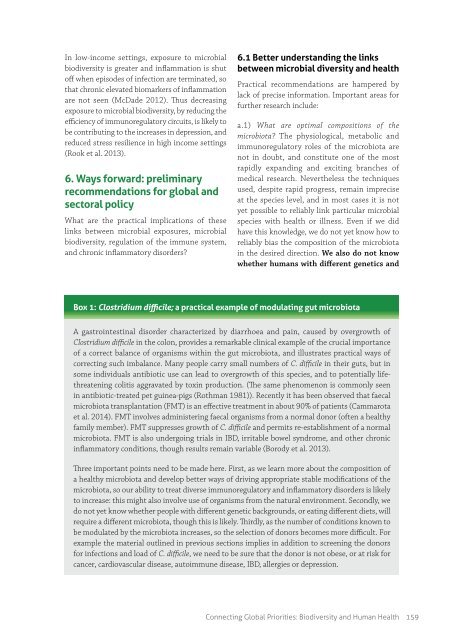Connecting Global Priorities Biodiversity and Human Health
1ZcgwtN
1ZcgwtN
Create successful ePaper yourself
Turn your PDF publications into a flip-book with our unique Google optimized e-Paper software.
In low-income settings, exposure to microbial<br />
biodiversity is greater <strong>and</strong> inflammation is shut<br />
off when episodes of infection are terminated, so<br />
that chronic elevated biomarkers of inflammation<br />
are not seen (McDade 2012). Thus decreasing<br />
exposure to microbial biodiversity, by reducing the<br />
efficiency of immunoregulatory circuits, is likely to<br />
be contributing to the increases in depression, <strong>and</strong><br />
reduced stress resilience in high income settings<br />
(Rook et al. 2013).<br />
6. Ways forward: preliminary<br />
recommendations for global <strong>and</strong><br />
sectoral policy<br />
What are the practical implications of these<br />
links between microbial exposures, microbial<br />
biodiversity, regulation of the immune system,<br />
<strong>and</strong> chronic inflammatory disorders?<br />
6.1 Better underst<strong>and</strong>ing the links<br />
between microbial diversity <strong>and</strong> health<br />
Practical recommendations are hampered by<br />
lack of precise information. Important areas for<br />
further research include:<br />
a.1) What are optimal compositions of the<br />
microbiota? The physiological, metabolic <strong>and</strong><br />
immunoregulatory roles of the microbiota are<br />
not in doubt, <strong>and</strong> constitute one of the most<br />
rapidly exp<strong>and</strong>ing <strong>and</strong> exciting branches of<br />
medical research. Nevertheless the techniques<br />
used, despite rapid progress, remain imprecise<br />
at the species level, <strong>and</strong> in most cases it is not<br />
yet possible to reliably link particular microbial<br />
species with health or illness. Even if we did<br />
have this knowledge, we do not yet know how to<br />
reliably bias the composition of the microbiota<br />
in the desired direction. We also do not know<br />
whether humans with different genetics <strong>and</strong><br />
Box 1: lostridiu diile a practical example of modulating gut microbiota<br />
A gastrointestinal disorder characterized by diarrhoea <strong>and</strong> pain, caused by overgrowth of<br />
Clostridium difficile in the colon, provides a remarkable clinical example of the crucial importance<br />
of a correct balance of organisms within the gut microbiota, <strong>and</strong> illustrates practical ways of<br />
correcting such imbalance. Many people carry small numbers of C. difficile in their guts, but in<br />
some individuals antibiotic use can lead to overgrowth of this species, <strong>and</strong> to potentially lifethreatening<br />
colitis aggravated by toxin production. (The same phenomenon is commonly seen<br />
in antibiotic-treated pet guinea-pigs (Rothman 1981)). Recently it has been observed that faecal<br />
microbiota transplantation (FMT) is an effective treatment in about 90% of patients (Cammarota<br />
et al. 2014). FMT involves administering faecal organisms from a normal donor (often a healthy<br />
family member). FMT suppresses growth of C. difficile <strong>and</strong> permits re-establishment of a normal<br />
microbiota. FMT is also undergoing trials in IBD, irritable bowel syndrome, <strong>and</strong> other chronic<br />
inflammatory conditions, though results remain variable (Borody et al. 2013).<br />
Three important points need to be made here. First, as we learn more about the composition of<br />
a healthy microbiota <strong>and</strong> develop better ways of driving appropriate stable modifications of the<br />
microbiota, so our ability to treat diverse immunoregulatory <strong>and</strong> inflammatory disorders is likely<br />
to increase: this might also involve use of organisms from the natural environment. Secondly, we<br />
do not yet know whether people with different genetic backgrounds, or eating different diets, will<br />
require a different microbiota, though this is likely. Thirdly, as the number of conditions known to<br />
be modulated by the microbiota increases, so the selection of donors becomes more difficult. For<br />
example the material outlined in previous sections implies in addition to screening the donors<br />
for infections <strong>and</strong> load of C. difficile, we need to be sure that the donor is not obese, or at risk for<br />
cancer, cardiovascular disease, autoimmune disease, IBD, allergies or depression.<br />
<strong>Connecting</strong> <strong>Global</strong> <strong>Priorities</strong>: <strong>Biodiversity</strong> <strong>and</strong> <strong>Human</strong> <strong>Health</strong><br />
159


